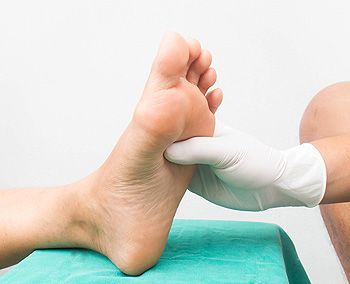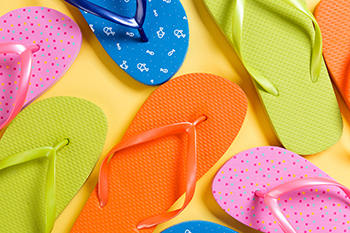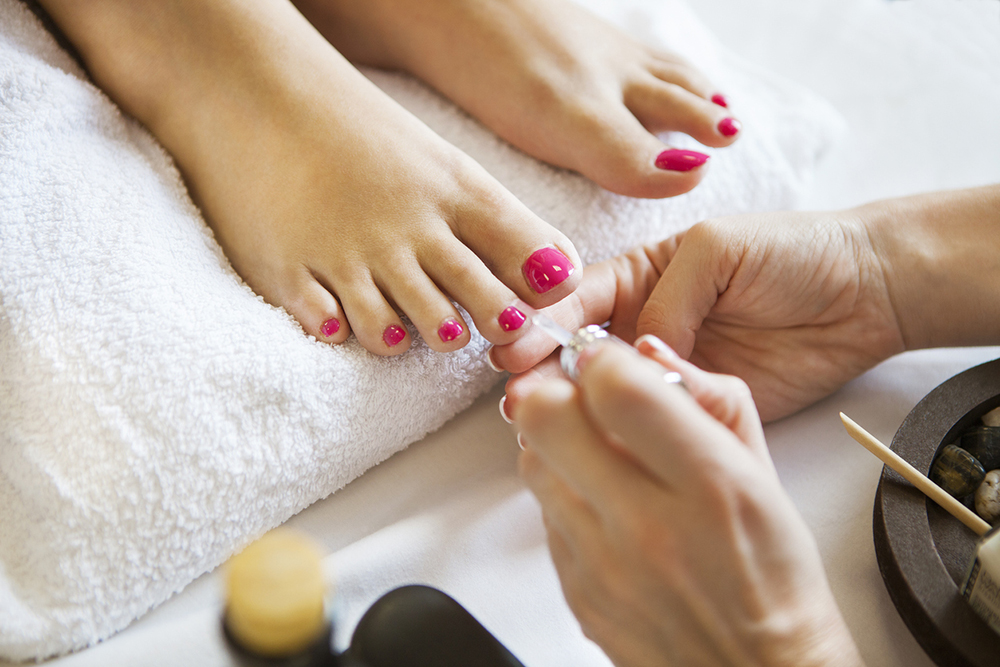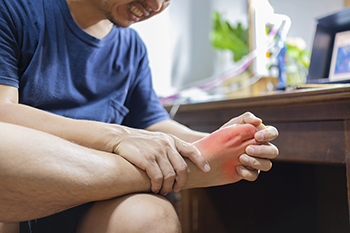Connect With Us
Blog

Diabetes is a condition that can affect the feet. Maintaining proper diabetic foot care is crucial in preventing unwanted foot ailments from developing. This can begin by washing and drying the feet every day, followed by applying a moisturizer on them. It is helpful to refrain from using any creams between the toes, as this may lead to additional foot conditions. Diabetic patients may have neuropathy, which is the inability to feel sensations in the feet and lower legs. As a result, using a mirror is a good way to check the soles of the feet for any cuts or scrapes that may have developed. It is beneficial to have the toenails properly trimmed weekly, and this helps to prevent an ingrown toenail from developing. Many people who are diabetic know the importance of refraining from walking barefoot, which can be detrimental to the feet. If you have diabetes, it is strongly suggested that you are under the care of a podiatrist who can help you to manage this serious condition.
Diabetic foot care is important in preventing foot ailments such as ulcers. If you are suffering from diabetes or have any other concerns about your feet, contact one of our podiatrists from Biebel & DeCotiis Podiatry Associates. Our doctors can provide the care you need to keep you pain-free and on your feet.
Diabetic Foot Care
Diabetes affects millions of people every year. The condition can damage blood vessels in many parts of the body, especially the feet. Because of this, taking care of your feet is essential if you have diabetes, and having a podiatrist help monitor your foot health is highly recommended.
The Importance of Caring for Your Feet
- Routinely inspect your feet for bruises or sores.
- Wear socks that fit your feet comfortably.
- Wear comfortable shoes that provide adequate support.
Patients with diabetes should have their doctor monitor their blood levels, as blood sugar levels play such a huge role in diabetic care. Monitoring these levels on a regular basis is highly advised.
It is always best to inform your healthcare professional of any concerns you may have regarding your feet, especially for diabetic patients. Early treatment and routine foot examinations are keys to maintaining proper health, especially because severe complications can arise if proper treatment is not applied.
If you have any questions please feel free to contact one of our offices located in Holmdel and Middletown, NJ . We offer the newest diagnostic and treatment technologies for all your foot and ankle needs.

Many students go back to school after having worn flip-flops most of the summer. Flip-flops are enticing footwear for young people because they are inexpensive, come in many colors, and can be fashionable. However, these sandals do not cushion or support feet and will often lead to foot problems. It is not generally known that new bone growth continues in the heels of feet through the teen years. Flip-flops do not cushion the heel and repeated stress from walking in these shoes can lead to heel inflammation in the bone growth area and cause pain. In addition to heel and arch pain, flip-flops can lead to sprained ankles, cuts and scrapes, and callus buildup on the heels and toes. Stretching exercises and shoe inserts can help with pain incurred from wearing these shoes, but reducing the time flip-flops are worn and keeping them for beach-going or around pools is best. If your child has foot pain after wearing flip-flops, it is suggested that you take them to see a podiatrist who can assess the damage and provide proper treatment.
Flip-flops are not always the best choice of footwear. If you have any concerns about your feet or ankles, contact one of our podiatrists from Biebel & DeCotiis Podiatry Associates. Our doctors will assist you with all of your foot and ankle needs.
Flip-Flops and Feet
When the weather starts warming up, people enjoy wearing flip-flops. Flip-flops are comfortable, stylish, and easy to slip on and off; they're perfect for any summer beach goer. However, these shoes can cause harm to the feet.
How Can Flip-Flops Affect Me Long-Term?
- Ankle problems
- Hip problems
- Lower back problems
- Pain in the balls of the feet
- Problems with foot arches
- Changes in the way you walk
Are There Injuries Associated with Flip-Flops?
Yes. Since flip-flops are relatively weak and do not provide the same amount of support as sneakers, people who wear flip-flops regularly are more susceptible to injuries. On top of that, the open nature of the shoe makes your feet more prone to other problems, such as cuts and even infections. Common injuries and ailments include:
- Sprained ankles
- Blisters
- Infections
- Cuts and Scrapes
I like Wearing Flip-Flops. Are There Safe Alternatives?
When buying flip-flops, try to find ones that have sturdy soles and that are made of high-quality materials that will support for your feet. These flip-flops will cost more but will also last longer as a result.
If you have any questions please feel free to contact one of our offices located in Holmdel and Middletown, NJ . We offer the newest diagnostic and treatment technologies for all your foot and ankle needs.

Practicing everyday foot care may be instrumental in preventing unwanted foot conditions. Begin with washing and drying the feet thoroughly, followed by applying a good moisturizer. It is beneficial to trim the toenails straight across which may help to avoid painful ingrown toenails. Any cuts or sores that develop on the feet can be addressed when the top and soles of the feet are regularly examined. Studies suggest that certain foot conditions may arise as a result of poor foot hygiene. These conditions can include athlete’s foot and toenail fungus. The risk may be reduced when clean socks and shoes are worn as well as the proper shoe size. If you would like to know more about implementing everyday foot care, it is suggested that you consult with a podiatrist who can provide you with the knowledge you are seeking.
Everyday foot care is very important to prevent infection and other foot ailments. If you need your feet checked, contact one of our podiatrists from Biebel & DeCotiis Podiatry Associates. Our doctors can provide the care you need to keep you pain-free and on your feet.
Everyday Foot Care
Often, people take care of their bodies, face and hair more so than they do for their feet. But the feet are a very important aspect of our bodies, and one that we should pay more attention to. Without our feet, we would not be able to perform most daily tasks.
It is best to check your feet regularly to make sure there are no new bruises or cuts that you may not have noticed before. For dry feet, moisturizer can easily be a remedy and can be applied as often as necessary to the affected areas. Wearing shoes that fit well can also help you maintain good foot health, as well as making it easier to walk and do daily activities without the stress or pain of ill-fitting shoes, high heels, or even flip flops. Wearing clean socks with closed shoes is important to ensure that sweat and bacteria do not accumulate within the shoe. Clean socks help to prevent Athlete’s foot, fungi problems, bad odors, and can absorb sweat.
If you have any questions please feel free to contact one of our offices located in Holmdel and Middletown, NJ . We offer the newest diagnostic and treatment technologies for all your foot and ankle needs.

The joints in the big toe are affected with the condition that is known as gout. This painful arthritic condition happens as a result of excess uric acid in the blood. This can be caused by genetic reasons or from eating foods that are high in purines. These types of foods include shellfish, red meat, and drinks that are made with large amounts of sugar. Gout attacks generally begin at night and may last for several weeks. This condition can be managed when lifestyle changes are implemented, such as replacing some of the foods that are eaten with healthier choices. It is beneficial to engage in a gentle exercise program on a regular basis, in addition to drinking plenty of water daily. People who are overweight may be prone to developing gout, and additional weight may be lost when they limit the type of, and amount of, foods that are eaten. If you have had one or frequent gout attacks, it is strongly suggested that a podiatrist is contacted who can help you to manage, and possibly prevent, this uncomfortable condition.
Gout is a painful condition that can be treated. If you are seeking treatment, contact one of our podiatrists from Biebel & DeCotiis Podiatry Associates. Our doctors will treat your foot and ankle needs.
What Is Gout?
Gout is a form of arthritis that is characterized by sudden, severe attacks of pain, redness, and tenderness in the joints. The condition usually affects the joint at the base of the big toe. A gout attack can occur at any random time, such as the middle of the night while you are asleep.
Symptoms
- Intense Joint Pain - Usually around the large joint of your big toe, and it most severe within the first four to twelve hours
- Lingering Discomfort - Joint discomfort may last from a few days to a few weeks
- Inflammation and Redness -Affected joints may become swollen, tender, warm and red
- Limited Range of Motion - May experience a decrease in joint mobility
Risk Factors
- Genetics - If family members have gout, you’re more likely to have it
- Medications - Diuretic medications can raise uric acid levels
- Gender/Age - Gout is more common in men until the age of 60. It is believed that estrogen protects women until that point
- Diet - Eating red meat and shellfish increases your risk
- Alcohol - Having more than two alcoholic drinks per day increases your risk
- Obesity - Obese people are at a higher risk for gout
Prior to visiting your podiatrist to receive treatment for gout, there are a few things you should do beforehand. If you have gout you should write down your symptoms--including when they started and how often you experience them, important medical information you may have, and any questions you may have. Writing down these three things will help your podiatrist in assessing your specific situation so that he or she may provide the best route of treatment for you.
If you have any questions, please feel free to contact one of our offices located in Holmdel and Middletown, NJ . We offer the newest diagnostic and treatment technologies for all your foot care needs.

